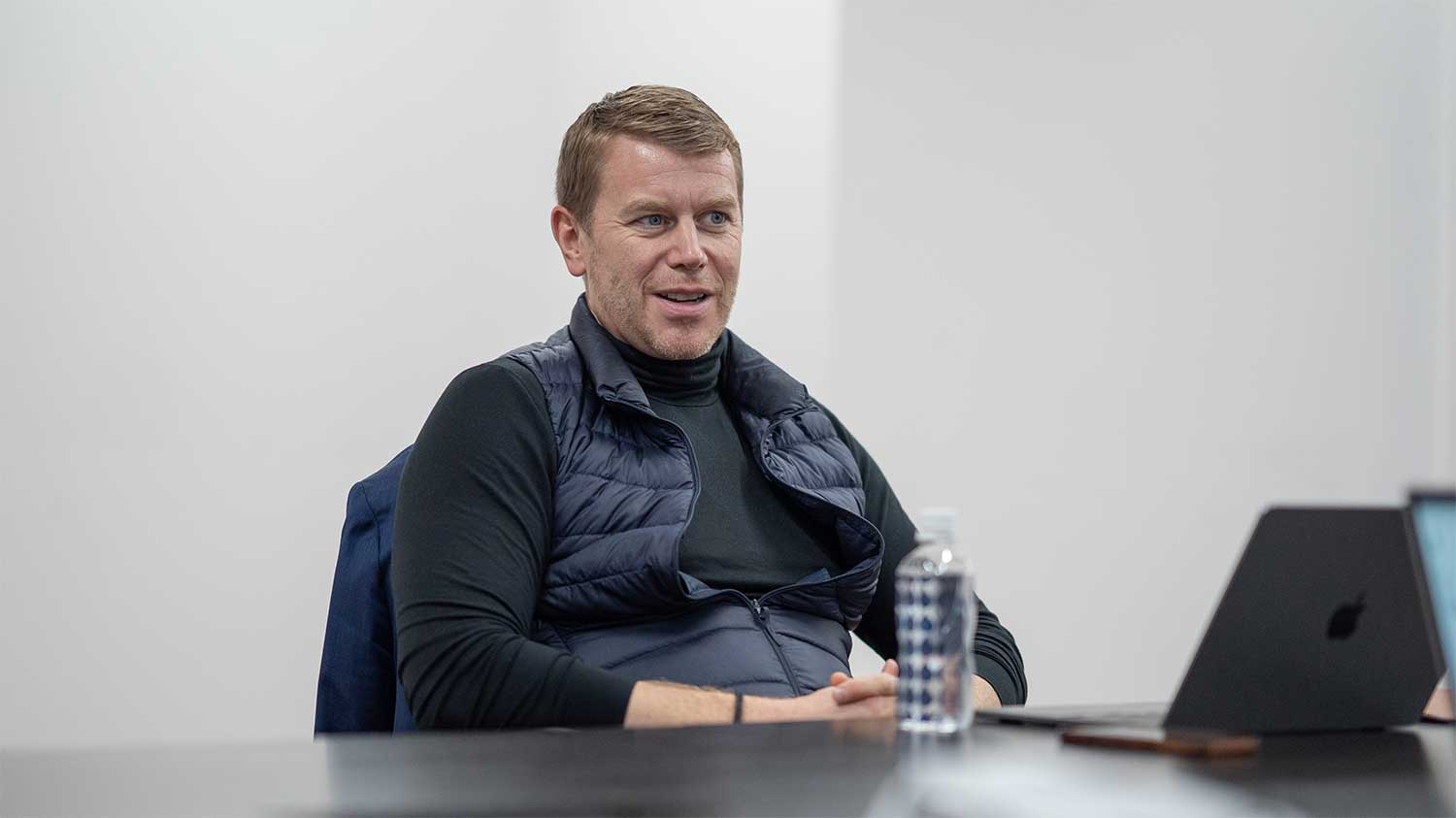2023.02.10
Interview with Stefan Heitmann, Founder PriceHubble and MoneyPark (Part 1 of 2)

This is a special conversation between Dr. Stefan Heitmann, Founder of PriceHubble, a Swiss PropTech company operating in 10 countries around the world, and Yusuke Mase, Executive Vice President of WealthPark. (Part 1 of 2)
Guest Profile
Stefan Heitmann
(Founder & Chairman, PriceHubble / Founder & Board member, MoneyPark)
Stefan Heitmann is the founder and chairman of the board of the company PriceHubble AG. He is also the founder, CEO and board member of one of Switzerland’s most successful fintechs, the mortgage platform MoneyPark AG as well as an investor in other fintech and proptech start-up companies in Germany and abroad. Previously, he was a partner at McKinsey & Company in Zurich until 2012. He studied Law and Economics at the Universities of Münster, London School of Economics, National University of Singapore and Cologne and holds a PhD in Banking, Corporate, Finance, and Securities Law
TOC
Story of Starting MoneyPark
――I’m excited to have the opportunity to interview you in Japan. First of all, can you tell us your story, prior to founding PriceHubble?
Stefan:Thank you so much for having me. To answer your question: my professional career knows 3 chapters so far: McKinsey, MoneyPark and now PriceHubble. After having studied law and economics, I worked for McKinsey for 10 years. I came in as an analyst and I left as a partner and throughout those 10 years, I was basically only working for large banks across many countries and all areas of banking, i.e. asset management, investment banking and, to a large extent, retail banking. When you do consulting work with banks, you get to understand how banks truly work, and while I find it fascinating, I also believe there is a lot we can do in the banking business to improve the customer experience. This was what triggered me to launch my first venture, MoneyPark, in 2012. I was just driven to create a new and better banking proposition for customers, specifically in the field of mortgage banking.
MoneyPark was the first technology enabled mortgage brokerage company in Switzerland and is still the clear market leader. Why is this better than a traditional bank? It’s offering so much more customer-friendly than that of a traditional bank. It offers choice, convenience and transparency at a totally different level. We have more than 150 mortgage providers on the shelf, so you have a lot more choice than you have with a single bank. You also have so much more convenience because you can pick any of those products on the spot and the technology helps you do that.. It is like a supermarket for mortgages. You don’t have to go from bank to bank if you want to compare rates. Finally, It’s also a lot more transparent because the customer gets to understand all of the product details and different rates without having to build this knowledge base by themselves. So those are the main attributes of the MoneyPark model that are unique to MoneyPark and create a superior customer experience to traditional banking.

――That’s fantastic. Were there any existing models or services for digitizing the mortgage process, which was very manual in 2012?
Stefan:At the time in Switzerland, there was nothing. So the technology was new, providing the customer with a digital product shelf and a huge choice of products was entirely new to the market. Also, the business model, i.e. delivering the experience in a technology driven, transparent manner, but paired with highest quality of advice to the customers, was new. That’s why we didn’t only rely on technology. We hired advisors who talk with customers face to face, and we even opened branches. It is a hybrid model. You can do it all online, you can also do it online and offline or even do it all offline with an advisor. But the advisor and the customer are not sitting across from each other. They are sitting next to each other and in front of the screen so that the customer can see every step of the process. That was important for me because I wanted to make the mortgage selection process so much more transparent for the customers. I also wanted to change the role of the advisor – away from selling a single product and on to become an independent advisor helping the customer to navigate the market.
――Interesting. What steps did you take when first establishing the business, specifically in regards to product development, securing distribution partnerships, and expanding operations through the opening of additional branches?
Stefan:I started with a vision to build a new type of banking model that would change the customer’s experience. But obviously, the vision itself is not enough. It has to be backed by a business model that would hopefully become commercially successful. To achieve this, I worked on developing a business model for the company and then began building the technology to support this new customer experience. Once the technology was nearing completion, we started trying to get partners with banks to put their products on our shelf. After securing these partnerships, we opened our first branch. We started with a small team of 15-20 people, all eagerly waiting for our first customer back in September 2012.
Founding of PriceHubble
――Then you build PriceHubble. When did you come up with the idea for PriceHubble?
Stefan:I founded PriceHubble in 2017, five years after I started MoneyPark. The reason for starting PriceHubble was that I noticed, repeatedly, points of frustration in our client experience and client-advisor relationship. We were doing pretty well as the business grew nicely, but I felt we could still do a better job. Let me give you two examples.
We repeatedly encountered situations where many customers came to us looking to purchase a specific property. They would speak with our advisors, but by the time they had made a decision to buy, the property was no longer available. Other buyers had been quicker to act, and the customers we were speaking with were left without a property to purchase. All we could say was “please come back when you find another property,” leaving the customers disappointed and our advisors without the ability to complete their advice. I was also disappointed as it resulted not only in lost revenue for the business, but also in a dissatisfying customer experience. That was one example.
The second part, which to this very day, I think we can do a lot more in the banking world is taking care of customers post-transaction, or, put it differently, looking after our existing customers. By 2017, we had already financed tens of thousands of customers. All of those customers have confided in us and trusted us with their personal and their property information, and signed the mortgage loans we offered.However, once the mortgage deal was completed, there was no further reason for the customer to interact with us for years to come, and our advisors reached out to them far too rarely, if at all. In short, the customers had no need for another mortgage right away and our advisors had nothing else to offer.

So I started thinking, what can I do? The product “mortgage” was not the answer, but the property itself remains to be always on the customers’ front of mind. It’s the property where the customer gets emotional, not the mortgage. Also, so many lifetime decisions are linked to or impacted by your property ownership. So I knew the journey had to start with the property, not with the mortgage. I started looking around, trying to find anything strong, data-driven, innovative and digital that I could also expose my customers to. There was nothing, not in Switzerland, not elsewhere. That’s why I decided to start PriceHubble. Real estate is a highly emotional and personal topic, and customers have an ongoing interest in the value of their property, both before and after purchase. How much is your property worth, even after you bought it? How many properties get sold around your neighborhood? How many are currently on the market? And what’s your property looking like if another construction comes up and it affects the value of your property and so on and so forth. There’s always questions that you have when it comes to your property or the one that you’re interested in.
And all of these questions to this very day were not answered. That’s actually something that is a significant issue for many people. So, I wondered if there was a technology solution that would allow me to provide this information to the customer? There was nothing like any supplier and information. The data sources were there, but in various spots in different places. They were not nicely put together, there were lots of gaps in the information or insights missing. Where information existed, it was not made easy for customers to understand. So long story short, there was no technology, no supplier. So, what do you do if you are an entrepreneur at heart? That’s how I started PriceHubble – a company that brings the very latest of data science with top notch product design to mare it easy for customers to understand everything there is to know about their property on the one hand and, the other, that actually helps businesses like my mortgage business to build a deeper, more engaging customer relationship. That’s our birth story.
――You are truly an entrepreneur. How did you arrive at “pricing” a solution to those pain points?
Stefan:At first I really tried to put myself into the customer’s shoes. If I were a customer, what are the questions that I wish somebody would help me find answers for. How much is this home worth? I know what the seller wants for it, and what I maybe would pay for it, but I didn’t really know what it’s worth. And not only when you buy it. You live in a property for five years, you lose touch with what’s happening. Your property doesn’t move, but everything around it does – neighbors are selling their place, a new street is being built, a bus stop is being opened, new construction is happening, pollution in the air is affecting your quality of life. There’s a lot of things that happen around your property. So you would be naturally interested and understanding these factors and their impact on value. But there was no product that helped customers understand these factors and their impact on value. So I decided to build technology leveraging the latest of machine learning and artificial intelligence that allows customers to understand the factors that are impacting property value.

――Were there any similar companies at that time?
Stefan:No. There were tools which were built for the risk managers and lending officers of a bank. Traditionally, these are supporting a physical appraiser, and they got more and more replaced by what’s called “AVM”, an automated valuation model. But they have not been used at the front, customer-facing part. And there were so ugly to look at that you could never show them to a real end customer. And this is where PriceHubble comes in. PriceHubble builds not only data rich applications, it builds beautiful, user-friendly products. That’s what I love: building data driven technology that is valuable to both, the bank/professional players and the customer.
――What kind of members did you hire for your first team? And how did you attract them?
Stefan:It’s never easy. And when I found PriceHubbble, I was still running MoneyPark. I knew it’s gonna be very hard to run two companies at the same time, one is a local, Swiss based B2C mortgage company and the other one is an international, SaaS B2B company. So, I needed someone who was also operationally involved in the day-to-day business. That’s why I decided to work with PriceHubble’s co-founder, Markus. And then we looked for our first data scientists who are trained in machine learning methods in order to start building the first AVM. After that, we hired sales people. This is how the initial team came together.
PriceHubble’s Global Expansion
――You’ve already touched on this, but can you tell me again about the vision and mission of PriceHubble?
Stefan:We want to change banking and real estate markets around the world by creating a better customer experience with data-backed digital solutions. PriceHubble is a company that empowers other companies. We’re not here to disrupt a bank or broker and take them out of the market. In fact, the opposite. We build very strong customer cockpits. Dashboards and customer platforms that help our customers to stay in touch with their customers at a totally different level, a lot more frequently with a lot better information than they could manually do. And in doing so, it’s living up to our mission of changing the way that a bank, for instance, interacts with their customer or brokerage accounts.
――Did you already have the vision of expanding internationally from day one, or was it incremental as far as your process?
Stefan:The vision for expanding internationally was always there, as I had previously founded and run a B2C Company operating in one market only, I was very thrilled to start a B2B company that knows no natural borders and customer boundaries. While we do find local customers in our B2C business, we started supporting large companies in our B2B business and therefore we scaled internationally only one year after I founded the company. So, I bought another company in France and France became our first international market. The next year, I bought a company in Germany, and it became PriceHubble Germany. We acquired four companies so far and thereby entered four markets. The other five markets that we entered are greenfield entries. When we buy a local company, the main reason is for data, team and customer relationships. Very few data sources are internationally relevant because property is a local market. So you need local data or regional data, national data. That sort of international scalability of data is very limited. I was looking indeed for data sources and sales/team resources that help us to gain momentum at a faster pace.
――How did you formulate a strategy for international expansion in terms of identifying the next country and the localization efforts?
Stefan:There are some points we’re looking at. One is a more strategic perspective. Typically, when it comes to internationalization, you want to be present in the larger countries. This is the large market pool, a large customer pool creates a lot of value. And hence, in Europe, you want to be present in France, Germany, and in the UK which are the three largest real estate markets. It also plays into our vision of building the global leader in our fields of highly advanced data-focused digital solutions.
And then there is a second angle: opportunistic opportunities. For instance, we entered Czechoslovakia, a smaller country in Europe. But there was a company doing something similar to what we are doing. They have started after us. But they approached us, and said “ Would you be interested in partnering? Why don’t we just become one company?”. Actually Czechoslovakia was not on the short list of countries, but it was a great opportunity for us. It became a fantastic collaboration.
And the final factor to consider is client demand. We have certain multinational clients that would like us to be present in more than one market. And if the clients would like you to support them in multiple countries, you look at those countries as potential entries. This is how we scaled, we’re now in 10 countries and it’s not going to stop.

Interviewer:WealthPark COO & CPO Yusuke Mase
PriceHubble AG.
Founder Dr. Stefan Heitmann
Brandschenkestr. 30, 8001 Zurich
Company Website: https://www.pricehubble.com/en/
<For inquiries>
PriceHubble
Contact: https://www.pricehubble.com/en/contact/
WealthPark PR manager
Mail: pr@wealth-park.com




